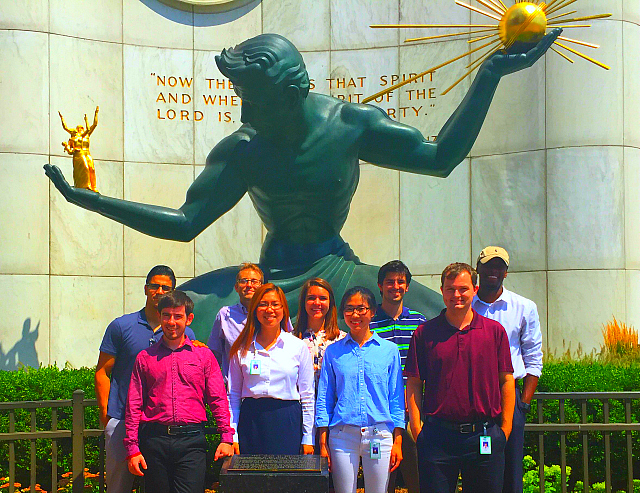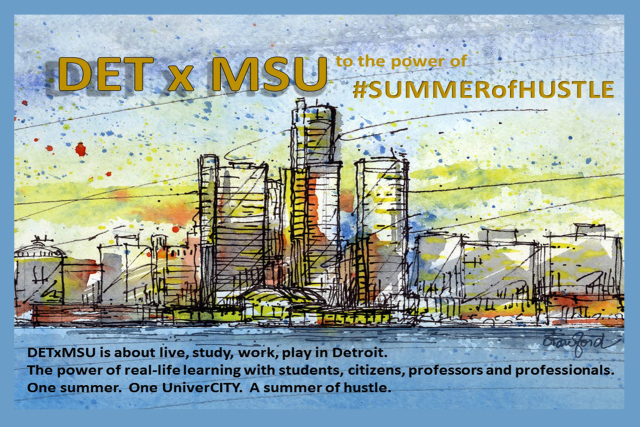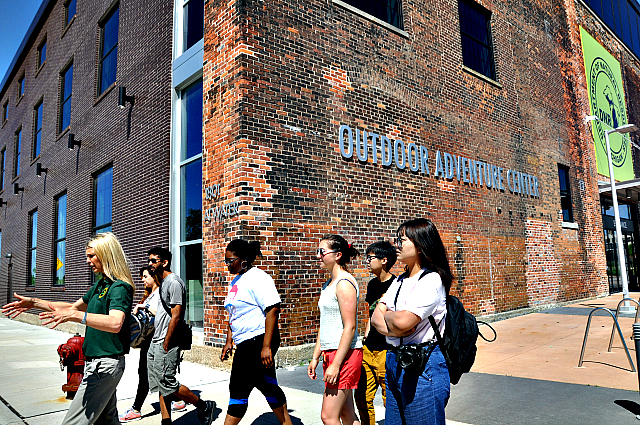Matthew Wood, August 21, 2016

You may have heard that the city of Detroit is on the rise again after a series of financial and social challenges. But the renaissance of this once great metropolis won?t be completed by the addition of sports stadiums or inspirational car commercials. It will be done by locals who care about its future and young people who want to be the next generation of civic leaders.
That?s the idea behind Michigan State University?s DETxMSU program, a series of innovative projects where nearly 60 students spent the summer immersing themselves in the city?s political, business, and cultural concerns in order to learn how to redefine Detroit.
?[The program is] intended to go beyond the practice of what they were learning in college, to learning about civic engagement, about culture and the history of Detroit,? says MSU Provost and Executive Vice President for Academic Affairs June Youatt, who spearheaded the program. ?The idea was to have a real immersion experience, where they lived, played and worked alongside people of Detroit.?
Pat Crawford, the Associate Director for MSU?s School of Planning, Design & Construction, took the reins of making the program a reality. She said it differed from other Detroit programs in its wide range of concentrations throughout the city.
?What we do differently is we have these seven classes that all work together,? she says. ?It?s a cross-pollination, not just discipline-specific. They do these projects within their expertise, but they?re able to share. I think that multi-discipline approach is one of the key things that pushed our launch.?
She helped lead a program called DesignThink, where landscape architecture students studied the city?s historical architecture and urban design.
Other classes looked at the city?s small business and arts communities, with another class focusing on data collection and analysis to help the city?s urban planning.
Political Science professor Josh Sapitochne headed the InnovateGov program, which embedded students within Detroit?s policymaking institutions to look at how to combat the skyrocketing number of home foreclosures in the city.
?Our approach to the program was to place the partners, the City of Detroit, and city residents first,? he says. ?There is a temptation when developing programs about Detroit to adopt a savior mentality. You show up on the first day and announce that you?re from University X, you?re smart, you have great ideas, and you?re here to impart your wisdom. We wanted to build the trust and relationships with our partners early on. They needed to know that we were not showing up to treat the people of Detroit as a research or academic ?opportunity.??

Students either applied or were ?hand-picked? by respective professors, Crawford said. They spent the entire summer living in Detroit on the campus of Wayne State University — the goal being total immersion in the city?s culture.
Each student then gave a presentation talking about not just what they did, but what they learned from the experience.
?Complete immersion was one of our primary goals, so that the students can live there and see the evening activities,? Crawford says. ?I was amazed at the excitement and energy that the students and community representatives had for the work. The openness and the energy that everybody brought was amazing.?
The program ran through the summer in conjunction with Quicken Loans, whose owner, Dan Gilbert, has become a champion of Detroit with a number of investments in the city.
?I really enjoyed the businesslike approach from Quicken,? Crawford says. ?They were extremely supportive. They came to the table with some good questions. They were pretty involved with us.?
As for the future, MSU leaders see the model leading to expanded learning opportunities in Detroit and beyond.
This summer has been an incredible success,? Sapitochne says. ?Now that we?ve proven to ourselves that we can do it, the sky?s the limit. In terms of growth, we?ve been given a unique opportunity this summer, but there is nothing that precludes us from expanding this approach into other distressed communities around the state. We think we bring something quite unique to the table — our students.?
by Matthew Wood







